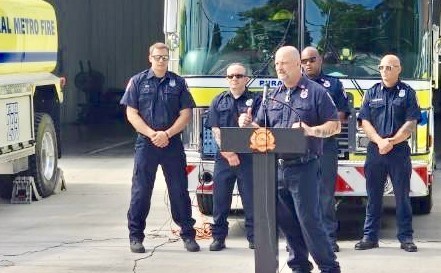You may find Rural Metro Fire Capt. Brad Rettig and his crew fighting a house fire. He may be at a roadside accident using his paramedic life-saving skills. Or he may be cleaning up a hazardous materials incident. Or fighting an out-of-control wildfire in Knox County. Or out there in Oregon, California or Colorado with a team fighting those wind-fueled hellish forest fires.

Brad Rettig
Rettig, 49, is captain of the Red Shift at Station 34 in Gibbs. He also spends a good amount of time at Station 33 in Corryton, the home of the agency’s new Specialty Wildland Team and its two new vehicles designed for wildfire emergencies – a brush truck and a water tender. “These two new vehicles have off-road capabilities and are able to ‘pump and roll’ during wildfire events,” Rettig explained. “They’re smaller and able to negotiate better in terrain than the bigger engines.”
The new 38-man team and the new equipment were introduced May 19, 2023, at Station 33. The team needs a leader and for this team it’s Capt. Rettig, a U.S. Marine veteran who has been with Rural Metro for 15 years. He is a professional first responder with a skillset that matches his dedication and drive.
Wildfires in Knox County are not unusual. It’s was April Fool’s Day – April 1, 2023 – when high winds blew trees down and the trees took many power lines to the ground, sparking the majority of the fires. The worst was probably the one on Maynardville Pike, Rettig said. “It was a definite red-flag day and we had so many fires going that every Rural Metro engine was working these wildfires. It took two days to knock them all down.”
Knox County’s wildfire season historically runs from mid-October to mid-April, he said, while the fires out west typically occur between the months of June and mid-October.
Rettig, a native of Little Rock, Arkansas, was a Marine “stinger gunner” (1993-97), adept at sending shoulder-fired anti-aircraft missiles at their targets, deployed three times but never to a war zone.
He ended up in Las Vegas, New Mexico, to attend New Mexico Highlands University and work as a seasonal firefighter. He ended up staying there for seven years, completing school for his EMS and paramedic certifications. Rettig also taught EMS courses there, and today he’s one of Rural Metro’s top instructors at the fire academy.
His Marine background is what led him into the fire-fighting business with Rural Metro. He spent a year working on Rural Metro ambulances before moving to the fire side. “There are many similarities between the military and what we do here and how we do it that I enjoy,” Rettig said. “It was a natural segue for me. The structure is there and the rules are laid out for you.”
Earning the Red Card from the National Wildfire Coordinating Group to battle the big wildfires is not easy. Firefighters have to pass a 40-hour online course and spend eight hours in the field being immersed in a variety of situations, Rettig explained. “They also have to take the Arduous Pack Test, power walking while carrying a 45-pound weight. They can’t run or jog and have to finish in 45 minutes or less. It’s tough.”
Then they must recertify annually, again taking the Pack Test. Rettig is building a team and some of his firefighters are about to undergo wildland fire training in Pennsylvania and Colorado, he said.
In 2018, Rural Metro’s team spent eight days in southern Oregon battling blazes working side-by-side with Rural Metro wildland firefighters based in Oregon. Rettig says they learned a lot about winds driving the fires, the up or down “blow ups” that happen and the fuels on the ground that feed the fires. “There is danger in structure and brush fires too but there is a lot of danger on these big fires.”
Except for the Covid year 2022, Knox County has had team members in Oregon, California and Colorado battling the blazes since 2018.
The firefighters train “for avoiding getting trapped and on how to protect yourself,” he said. “We all carry the tents we call shelters that encapsulates you completely,” Rettig said. “It will save your life.”
Rural Metro Public Information Office Capt. Jeff Bagwell said this new team will be available for deployment in Knox County as well as “anywhere our parent company has contracts with FEMA or other entities such as Cal Fire.”
“My guys love this work and they’re ready if we’re here or out west,” he said. “This is why we train so hard. They like the work.”
Tom King has been the editor of newspapers in Texas and California and also worked in Tennessee and Georgia.

